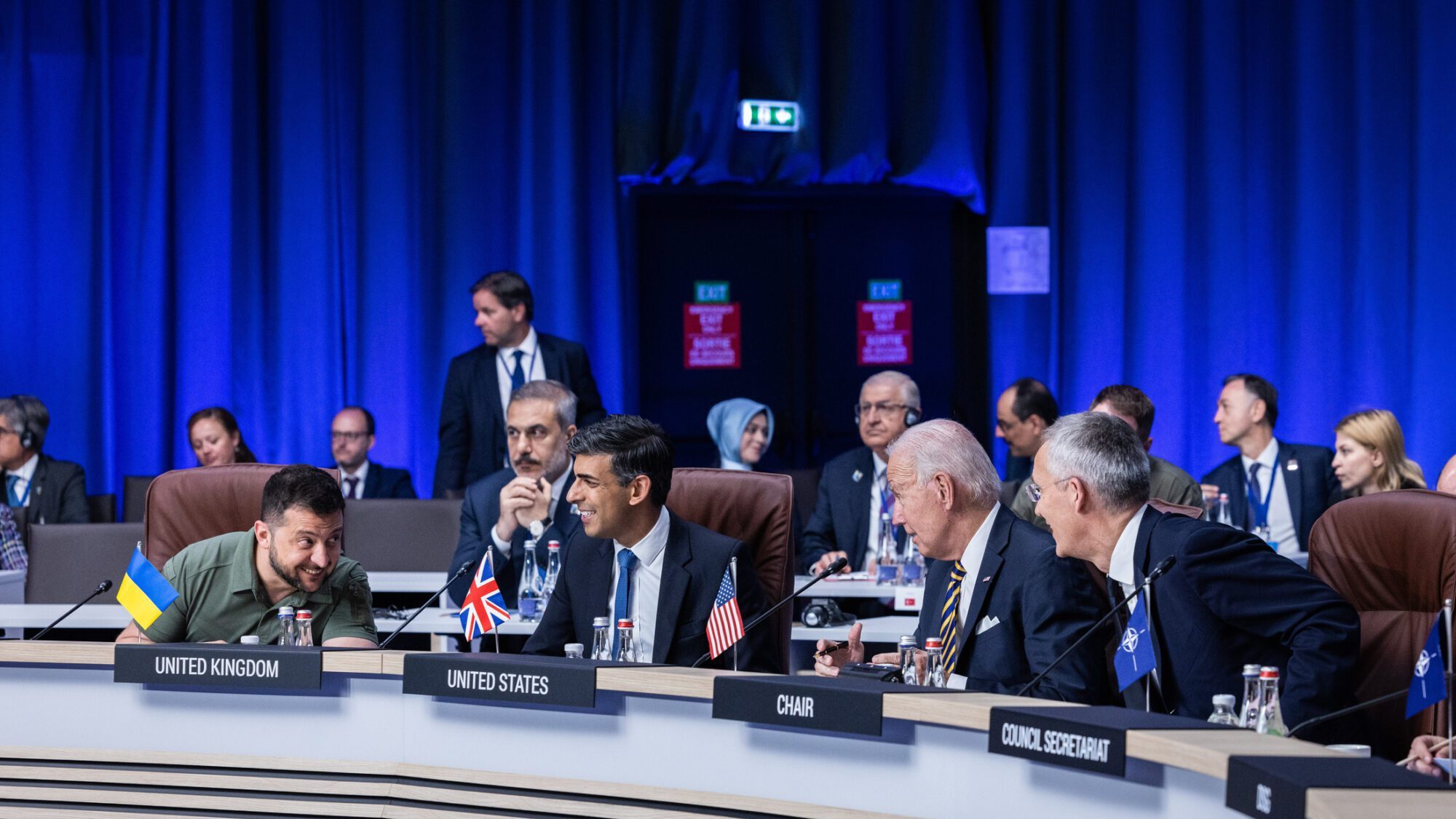
Ukrainian President Volodymyr Zelensky appeared more amicable toward his NATO hosts on the final day of the summit in Vilnius, Lithuania. L-R, Zelensky, British PM Rishi Sunak, U.S. President Joe Biden, and NATO Secretary-General Jens Stoltenberg.
Photo: © NATO
As the door to rapid NATO accession has been slammed shut for Ukraine, the G7 countries are instead promising long-term support for the nation at war.
From now on, NATO and Ukraine will meet in the NATO-Ukraine Council “to discuss and decide as equals,” Secretary General Jens Stoltenberg said at the first meeting of the newly created body, meant to upgrade Kyiv-NATO relations, as he wrapped up NATO’s two-day summit in the Lithuanian capital of Vilnius.
NATO allies, he continued, had agreed to a new multi-year assistance package to help transition Ukraine from Soviet-era to NATO equipment and standards, and make its forces fully interoperable with the 31-nation military alliance. In addition, the need for a so-called Membership Action Plan (MAP) had been dropped.
The UK, France, Germany, and the U.S. have been negotiating with Kyiv for weeks over a broad international framework of support that would include fighter jets, training, intelligence-sharing, and cyber defense. In return, Ukraine would pledge better governance, including through judicial and economic reforms and enhanced transparency.
Ukrainian President Volodymyr Zelensky expressed satisfaction with the declaration of support and with all pledges in the areas of military support, intelligence, and training. “The security guarantees are an important development as we move into NATO, this is very important,” he said.
Дуже потрібний вагомий успіх для України. Я вдячний усім лідерам, усім країнам НАТО за цілком практичну та безпрецедентну, враховуючи десятиліття наших відносин, підтримку для України. Сьогодні є гарантії безпеки для України на час руху в НАТО – дуже важливий пакет гарантій. Ми… pic.twitter.com/WykgTJuEfp
— Володимир Зеленський (@ZelenskyyUa) July 12, 2023
The initiative is intended to blunt Ukraine’s frustration as it continues to face uncertainty over whether and when it can join the alliance. While the Ukrainian leader did not get what he came for in Vilnius, mainly due to German and U.S. resistance, he said the Ukrainian delegation was “returning home with a significant security victory for our people, for our state.”
Following NATO’s Tuesday communiqué, which stated that the military alliance “will be in a position to extend an invitation to Ukraine when allies agree and conditions are met” Zelensky launched into a rare tirade, as he called the absence of a concrete timeline to membership “unprecedented” and “absurd.” Uncertainty regarding the matter, he added, was “weakness,” which to him seemed to indicate there was “no readiness, neither to invite Ukraine to NATO nor to make it a member of the Alliance.”
We value our allies. We value our shared security. And we always appreciate an open conversation.
— Володимир Зеленський (@ZelenskyyUa) July 11, 2023
Ukraine will be represented at the NATO summit in Vilnius. Because it is about respect.
But Ukraine also deserves respect. Now, on the way to Vilnius, we received signals that…
While the Kremlin was no doubt relieved over Ukraine’s delayed accession to NATO, it voiced concerns about the G7’s pledges towards providing security guarantees. “We believe that it is a mistake and it can be very dangerous,” Kremlin Spokesman Dmitry Peskov told reporters.
Peskov went on to note that “by providing any security guarantees to Ukraine, these countries in fact show disregard for the international principle of indivisible security,” and that through this action, they are “encroaching on Russia’s security.”
In 2024, on the 75th anniversary of the alliance’s founding, NATO will hold its next Summit in Washington, D.C. Whether allies will retain the body’s apparent cohesion until then as the war in Ukraine continues to rage—demanding ever more funds and resources in the process—remains to be seen.
